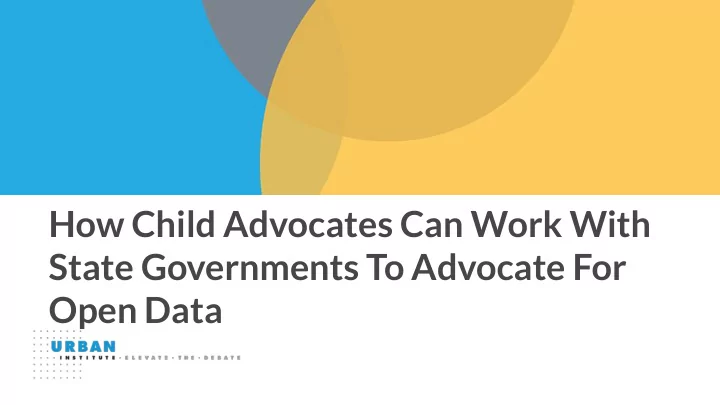

How Child Advocates Can Work With State Governments To Advocate For Open Data
Welcome! Welcome to the webinar! Kathy Pettit Rob Pitingolo Florencia Gutierrez Deborah Stein Urban Institute Urban Institute KIDS COUNT Partnership for America's Children 2
About this research http://neighborhoodindicators.org/childopendata 3
Thank you! Special thanks ▪ Carole Cochran, University of South Dakota ▪ Sarah Hughes, Colorado Children's Campaign ▪ Deborah Stein, Partnership for America's Children ▪ Kristie Tingle, Center for Public Policy Priorities in Texas ▪ Katya Abazajian, the Sunlight Foundation ▪ Jessica Carsten, Tyler Technologies (Socrata) ▪ Tyler Kleycamp, State of Connecticut ▪ Michelle Riordan-Nold, Connecticut Data Collaborative 4
Poll
Child advocacy organizations and state governments can work together to better leverage open data to improve the lives of children and families.
Questions Questions for You ▪ Are there barriers to taking the steps we recommend? ▪ What questions could data help you answer? ▪ What would be #1 on your data wish list? ▪ What data do you have that you wish was more detailed or granular? ▪ What threats to data are there in your state? 7
Current State of Practice
Current state of practice State of practice for child advocates ▪ Advocates know the value of data for making the case ▪ Advocates acquire data through personal relationships with agency staff or agency websites 9
Current state of practice State of practice for state governments ▪ Open data: data that anyone can freely use and share ▪ Agencies generally decide which data to publish ▪ States moving to internal use of data and analytics 10
Current state of practice Current content of state data portals Most Common Data Sets ▪ Urban analyzed open data 10 9 portals from 10 states 8 ▪ No data sets are universal 7 6 6 across states (today) 5 5 4 4 4 4 ▪ Most common data on 3 2 topics: child care, schools, 1 health & public assistance 0 Child Care School Graduation Immunizations Public Licensing Performance Rates Assistance 11
Example from Connecticut CONNECTing Children and Families to Care ▪ CT sought to improve ▪ Goal was to create an open, children’s behavioral health accessible, transparent, services after Sandy Hook public data system ▪ State CDO facilitated a Data ▪ Cataloged and tracked the Integration workgroup publishing of 36+ datasets 12
Why this matters Why improving the state of practice matters ▪ Data advances the missions of organizations by allowing them to answer important questions ▪ Protecting data against threats allows the field to thrive now and into the future ▪ Wider access elevates the ▪ Ultimately: better importance of central issues outcomes for kids! 13
Expanding Advocacy for Data: Steps for Child and Family Advocates
Poll
I frame conversations around the questions you have, and then think how I can work with agencies to get the data you need. -Tyler Kleykamp, Connecticut Chief Data Officer
Steps for advocates Step 1. Create a Data Wish List ▪ Lead with questions ▪ Include data already collected, as well as “long shot” wishes ▪ Look at data in hand to see if different cuts would add value ▪ Visit the state’s open data portal for ideas 17
Steps for advocates Step 2. Connect with State Data Managers ▪ Consult the agency data experts you already know ▪ Seek out “chief data officer” - use the open data portal to find the right people ▪ Ask for a call to share your priorities and data needs 18
Steps for advocates Step 3. Advocate for New Data Releases ▪ Lowest hanging fruit are data collected but not published ▪ Some data exist, but need to be summarized to protect privacy ▪ You may need to advocate for data that are not collected 19
Steps for advocates Step 4. Push for Expanded Access to Currently Shared Data ▪ Informal access to data often works but has downsides ▪ Expanded access improves efficiency and timeliness ▪ Wider access elevates the importance of the issue for new audiences, such as civic technologists 20
Steps for advocates Step 5. Identify and Respond to Threats to Data Access ▪ Data without obvious value can get cut Data ▪ Perceived concerns about privacy are on the rise ▪ Advocates can use their authority to show that data can be released responsibly 21
Steps for States Five Steps for State Governments 1. Engage with state child & family agency staff 2. Promote open data to improve child well-being 3. Learn about the needs of users interested in child & family issues 4. Enhance the data and portal to meet the needs of child and family advocates 5. Conduct and publish a data inventory 22
Commentary Commentary Deborah Stein Network Director for the Partnership for America's Children 23
Resources External Resources ▪ NCOC's Civic Tech Initiatives: Tools and Learnings from a Civic Data Challenge Case Study ▪ Sunlight Foundation Guide to Tactical Data Engagement ▪ What Works Guide to Data Inventories 24
Publications Website: www.neighborhoodindicators.org/childopendata ▪ Harnessing the Power of Open Data for Children and Families (brief) ▪ Five Steps States Can Take to Advance Child Well- Being through Open Data (fact sheet) ▪ Five Steps Child Advocates Can Take to Expand Access to State Data (fact sheet) ▪ List & Scan of State Open Data Portals (spreadsheet) 25
Questions Questions for You ▪ Are there barriers to taking the steps we recommend? ▪ What questions could data help you answer? ▪ What would be #1 on your data wish list? ▪ What data do you have that you wish was more detailed or granular? ▪ What threats to data are there in your state? 26
Thank You! Additional questions? Kathy Pettit – kpettit@urban.org Rob Pitingolo – rpitingolo@urban.org
Recommend
More recommend